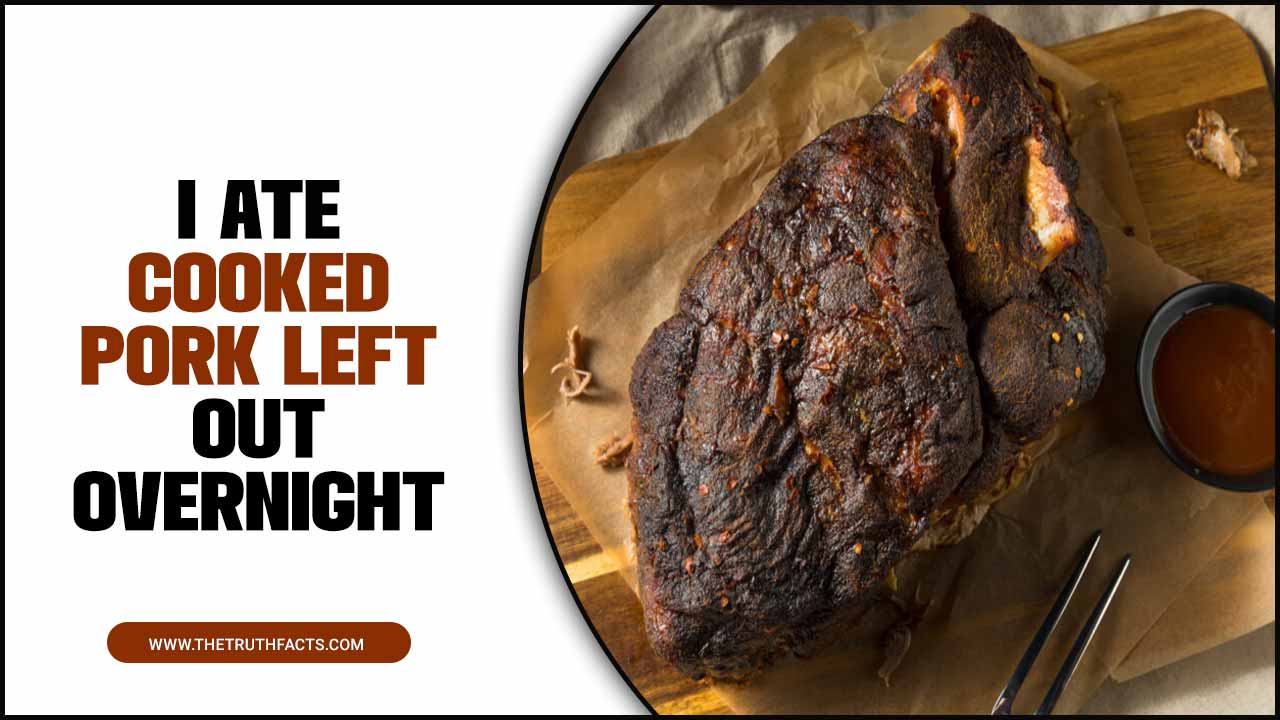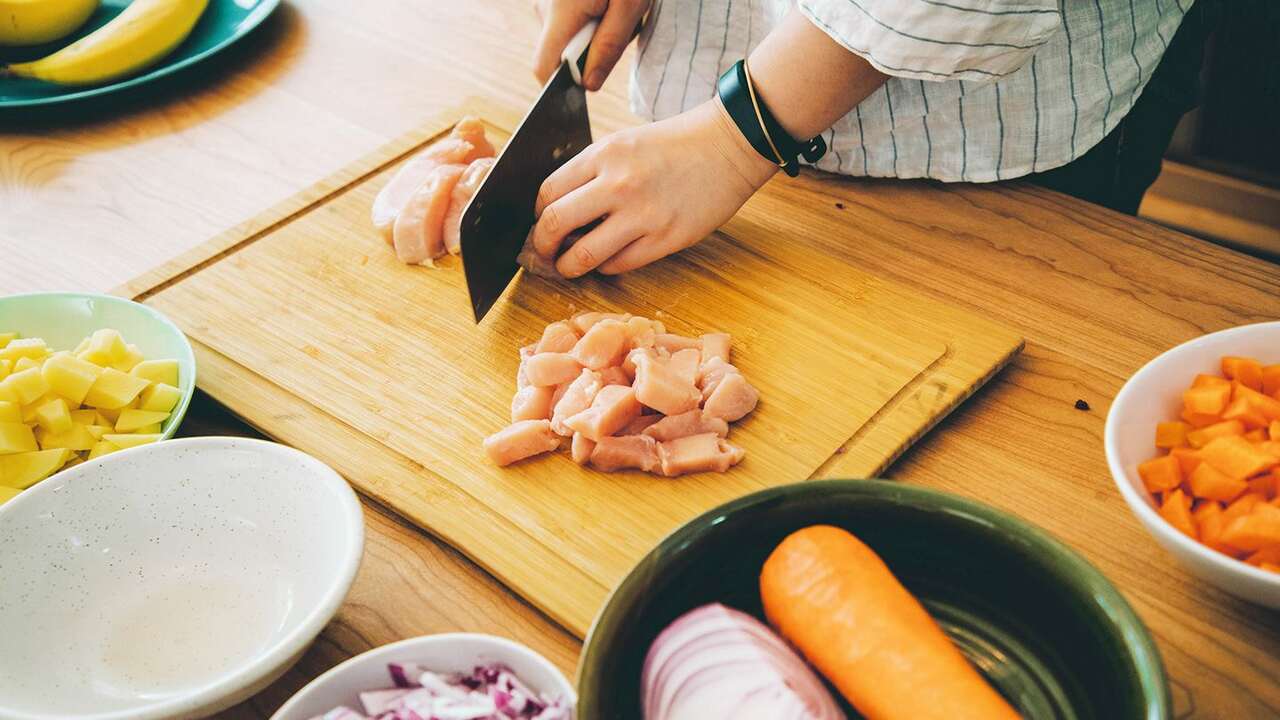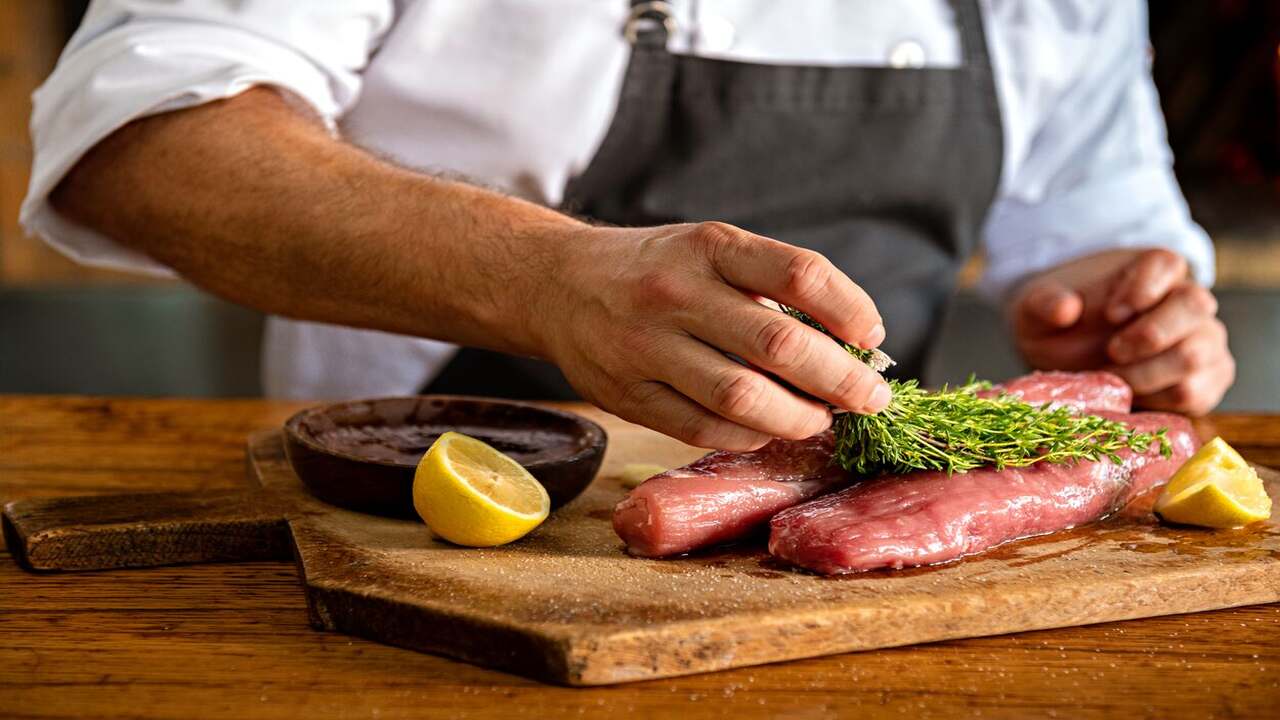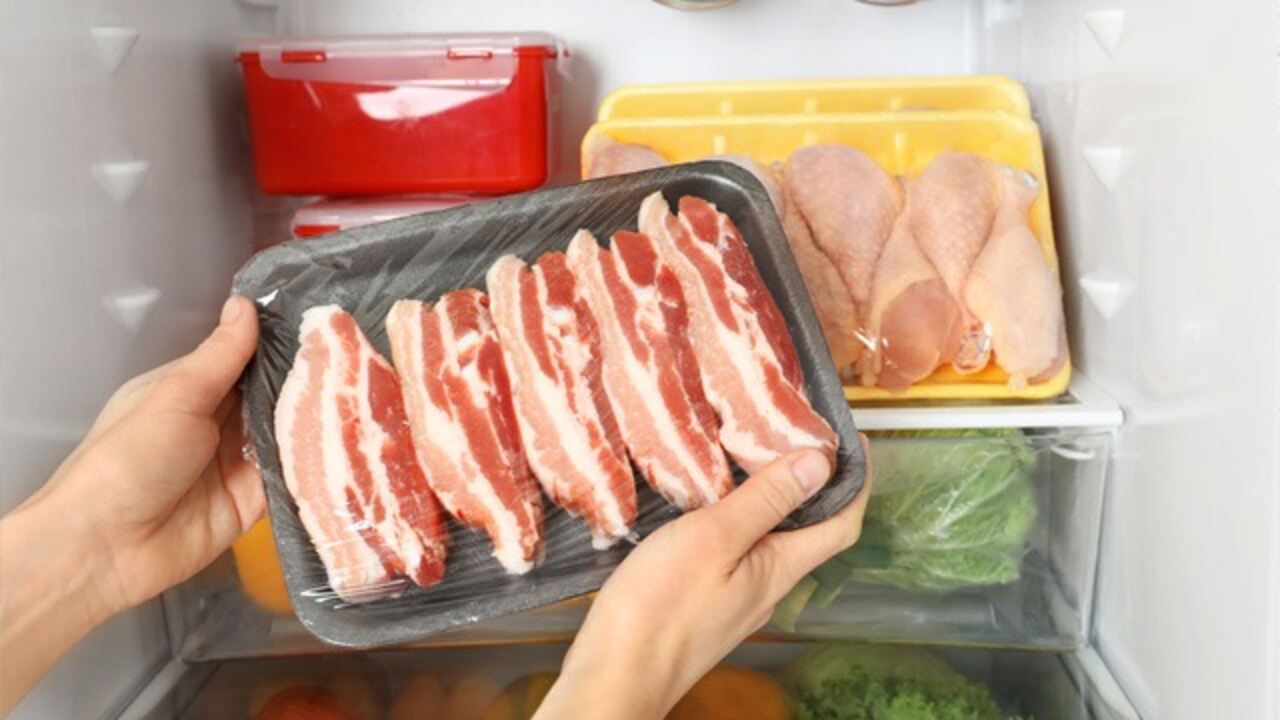Food safety is a critical aspect of our daily lives that we should never take for granted. Properly handling and storing food can prevent the growth of bacteria, viruses, and other pathogens that can cause foodborne illnesses.
However, there are times when we may forget to refrigerate or cook our food properly, which can lead to concerns about whether or not it is safe to consume.
we will explore the question, “What if I ate cooked pork left out overnight?” We will discuss the risks of consuming pork left out of the refrigerator for an extended period and what steps you can take to prevent foodborne illness. We will also address the common misconceptions surrounding the safety of consuming cooked pork that has been left out overnight.

Possibilities Of Food Poisoning If I Ate Cooked Pork Left Out Overnight

Consuming cooked pork left out at room temperature for an extended period of time poses a potential risk of bacterial growth. Spoiled or contaminated pork can lead to common foodborne illnesses, such as salmonella poisoning, which can cause symptoms like vomiting and diarrhea.
It is important to be aware of the signs of food poisoning, such as nausea and abdominal cramps, and to seek medical attention if you experience these symptoms after consuming leftover pork.
To prevent foodborne illnesses, practice proper storage and reheating techniques, such as refrigerating cooked pork promptly, reheating it to the appropriate internal temperature, and discarding any leftovers sitting out for too long. Taking these precautions and understanding the best practices for handling and storing pork will help ensure food safety and minimize the risk of food poisoning.
The Impact Of Temperature On Pork Quality

Leaving i ate cooked pork left out overnight significantly increases the risk of bacterial growth and foodborne illness. Bacteria thrive and multiply rapidly in the “danger zone” between 40°F and 140°F, the ideal temperature for bacteria to propagate.
To prevent food poisoning, it is crucial to store cooked pork properly at or below 40°F, such as by refrigerating it promptly. Following food safety guidelines is essential to ensure the quality and safety of cooked pork.
When in doubt, it is best to err on the side of caution and discard any cooked pork left out overnight to avoid potential health risks. Maintaining safe temperatures through refrigeration is the best way to preserve the quality and prevent the growth of harmful bacteria in cooked pork.
The Aftermath Of Consuming Pork Left Out Overnight
Consuming cooked pork left out overnight can pose potential health risks. Bacteria can grow on food left at room temperature for extended periods, including pork chops. This can lead to food poisoning and other illnesses, resulting in symptoms such as vomiting and diarrhea.
It is important to practice proper food handling and storage techniques to prevent foodborne illness. The USDA recommends refrigerating leftovers promptly, ideally within two hours of cooking. You should store leftover pork in an airtight container or wrap it tightly in plastic before placing it in the fridge.
When reheating, ensure that the internal temperature reaches a safe temperature, typically 165°F. It’s always best to err on caution and discard any cooked pork left out overnight. Properly storing and handling leftover pork is essential for food safety.
Identifying Signs Of Spoilage In Cooked Pork
You can identify signs of spoilage in cooked pork left out overnight through various indicators. One such indicator is a foul odor, which can indicate bacterial growth and spoilage. Additionally, a slimy texture or sticky surface on the pork may suggest bacterial contamination and should be avoided.
Visible mold growth on cooked pork is another clear indication of spoilage and should not be consumed under any circumstances. Another sign to look out for is a change in color, especially a greenish or greyish hue, as this can also suggest spoilage.
Finally, if you experience nausea, vomiting, or diarrhea after consuming cooked pork left out overnight, it may be a sign of food poisoning. Awareness of these signs is important to ensure food safety and avoid any health risks associated with consuming spoiled pork.
Safe Practices For Handling And Storing Cooked Pork

The dangers of leaving cooked pork out overnight go beyond mere inconvenience. Bacteria can multiply rapidly on cooked meat left at room temperature, potentially leading to foodborne illnesses such as food poisoning. To ensure the safety of cooked pork, it is essential to store it properly and refrigerate it within a safe time frame.
You should promptly place leftovers in an airtight container and store them in the fridge or freezer. When reheating, ensure the internal temperature reaches a safe range, typically 165 degrees Fahrenheit, using methods like microwaving or grilling.
By following these safe practices, you can protect yourself and others from harmful bacteria and enjoy your leftover pork without the risk of vomiting, diarrhea, or other symptoms of foodborne illness.
How Long Can Cooked Pork Safely Sit Out?
Regarding food safety, exercising caution and following proper guidelines are important. Do not leave cooked pork at room temperature for over two hours. Bacteria can grow rapidly on cooked meat if not stored properly or kept at the appropriate temperature.
If you have accidentally left cooked pork out overnight, it is best to discard it to avoid the risk of foodborne illnesses. To ensure the safety of your food, always store cooked pork in the refrigerator within two hours of cooking.
The Role Of Refrigeration In Preserving Cooked Pork

Refrigeration plays a crucial role in preserving the quality and safety of cooked pork. To prevent bacterial growth and reduce the risk of foodborne illness, it is important not to leave cooked pork at room temperature for more than 2 hours.
By refrigerating cooked pork within this timeframe, you can extend its shelf life and maintain its freshness. You can safely store leftover pork in the refrigerator for up to 4 days. While freezing, it can further extend its consumption duration to 3 months.
When reheating cooked pork, it is vital to ensure it reaches a safe internal temperature to kill any potential bacteria. Following these guidelines and practicing proper food safety measures, you can enjoy your cooked pork without worrying about harmful bacteria or toxins.
Tips To Properly Store, Reheat, And Consume Leftover Pork
Properly handling leftover pork is crucial to prevent foodborne illnesses. To ensure safety, storing cooked pork in the refrigerator within two hours of cooking is important. Place the pork in an airtight container or wrap it tightly in plastic wrap before refrigerating.
Leftover pork can be safely stored in the fridge for up to four days. If you won’t be able to consume it within that time frame, consider freezing it. When reheating leftover pork, ensure it reaches a safe internal temperature, typically 165 degrees Fahrenheit, to kill harmful bacteria. Be cautious of spoilage signs such as off smells, changes in color, or sliminess.
Discard the pork to avoid food poisoning if you notice any of these signs. By following these tips and being aware of food safety guidelines, you can enjoy your leftover pork without worrying about the risks.
Conclusion
consuming i ate cooked pork left out overnight can pose serious health risks. The temperature danger zone of 40°F to 140°F allows bacteria to grow rapidly on perishable foods, including pork. Consuming pork that has been left out overnight increases the risk of foodborne illnesses such as salmonella or E. coli.
To ensure food safety, following safe practices for handling and storing cooked pork is important. This includes refrigerating leftovers within two hours of cooking, reheating them to an internal temperature of 165°F, and consuming them within three to four days. Remember, when in doubt, it is always better to err on caution and discard any cooked pork left out overnight. Your health should always be a top priority.
Frequently Asked Questions
1.Is It Safe To Eat Cooked Pork That’s Been Left Out Overnight?
Ans: Leaving cooked pork at room temperature for an extended period can lead to bacterial growth and foodborne illnesses. It is best to refrigerate cooked pork within two hours of cooking to prevent contamination. If left out overnight, it is advisable to discard the pork to avoid the risk of food poisoning.
2.How Long Can Pork Sit Out Without Going Bad?
Ans: Do not leave pork at room temperature for more than 2 hours. Leaving pork out allows bacteria to multiply rapidly, increasing the risk of foodborne illnesses. To prevent spoilage, promptly refrigerate or freeze pork. If unsure, it’s best to discard it to avoid food poisoning.
3.How Long Is It Safe To Eat Leftover Pork?
Ans: Leftover pork can be safely consumed in the refrigerator within two hours of cooking. It is best to consume it within 3-4 days and discard it if it has an off smell, slimy texture, or unusual color. To extend its shelf life, freezing leftovers for up to three months is an option.
4.What Is The Food Poisoning In Pork?
Ans: Bacteria like Salmonella, E. coli, and Listeria can cause food poisoning from pork. Symptoms may include nausea, vomiting, diarrhea, abdominal pain, and fever. Proper cooking and handling of pork can help prevent food poisoning. Refrigerating or freezing cooked pork leftovers promptly is essential to avoid bacterial growth.
5.Is It Safe To Eat Cooked Pork That Has Been Left Out Overnight?
Ans: Leaving cooked pork out overnight is not safe. Bacteria can multiply rapidly at room temperature, increasing the risk of foodborne illnesses. It is important to refrigerate cooked pork within two hours of cooking to prevent spoilage and potential food poisoning. Discard any pork that has been left out for more than two hours.
